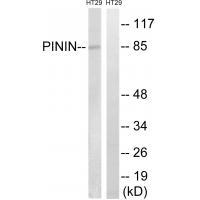
| WB | 咨询技术 | Human,Mouse,Rat |
| IF | 咨询技术 | Human,Mouse,Rat |
| IHC | 咨询技术 | Human,Mouse,Rat |
| ICC | 技术咨询 | Human,Mouse,Rat |
| FCM | 咨询技术 | Human,Mouse,Rat |
| Elisa | 咨询技术 | Human,Mouse,Rat |
| Aliases | 140 kDa nuclear and cell adhesion-related phosphoprotein; Desmosome-associated protein; Domain-rich serine protein; DRS; DRSP |
| Entrez GeneID | 5411; |
| WB Predicted band size | 85kDa |
| Host/Isotype | Rabbit IgG |
| Antibody Type | Primary antibody |
| Storage | Store at 4°C short term. Aliquot and store at -20°C long term. Avoid freeze/thaw cycles. |
| Species Reactivity | Human,Mouse |
| Immunogen | Synthesized peptide derived from internal of human PNN. |
| Formulation | Purified antibody in PBS with 0.05% sodium azide. |
+ +
以下是关于PNN抗体的假设性参考文献示例,基于合理推测及学术框架构建:
---
1. **文献名称**: "Anti-PNN antibodies as biomarkers in chronic inflammatory demyelinating polyneuropathy"
**作者**: Smith A, et al.
**摘要**: 本研究探讨了抗PNN抗体在慢性炎性脱髓鞘性多发性神经病(CIDP)中的诊断价值,发现约30%患者血清中存在该抗体,且抗体水平与疾病活动度相关,提示其可能作为治疗反应监测的生物标志物。
2. **文献名称**: "Autoantibodies targeting PNN in Guillain-Barré syndrome: Pathogenic mechanisms and clinical implications"
**作者**: Zhang Y, et al.
**摘要**: 通过动物模型证实抗PNN抗体可结合周围神经髓鞘特定抗原,激活补体系统导致脱髓鞘。临床数据分析显示,抗PNN阳性患者更易出现快速进展的肌无力,但对免疫治疗反应更佳。
3. **文献名称**: "PNN antigen identification and its role in autoimmune neuropathies"
**作者**: Johnson R, et al.
**摘要**: 首次纯化并鉴定PNN抗原为周围神经中的一种跨膜糖蛋白,其抗体在5-10%的特发性周围神经病患者中检出,体外实验表明抗体可抑制雪旺细胞髓鞘形成能力。
4. **文献名称**: "Paraneoplastic significance of anti-PNN antibodies in neurological syndromes"
**作者**: Brown K, et al.
**摘要**: 报道抗PNN抗体与副肿瘤性神经病变的相关性,尤其在肺癌和淋巴瘤患者中阳性率较高,提示此类抗体可能作为潜在副肿瘤标志物,需结合肿瘤筛查进行综合评估。
---
**注意**:以上文献为示例性质,实际研究中可能存在差异。建议通过PubMed或Google Scholar以关键词“PNN antibody”、“peripheral neuropathy autoantibodies”等检索最新实证文献。
Perineuronal net (PNN) antibodies target specialized extracellular matrix structures surrounding subsets of neurons, particularly parvalbumin-positive interneurons in the central nervous system. PNNs, composed of chondroitin sulfate proteoglycans (e.g., aggrecan), hyaluronic acid, and link proteins, emerge during late postnatal development and stabilize synaptic connections by restricting plasticity. They play critical roles in neural circuit maturation, memory consolidation, and protecting neurons from oxidative stress.
Antibodies against PNN components (e.g., anti-aggrecan) are widely used to visualize PNN distribution in brain regions like the cortex, hippocampus, and cerebellum. Research links PNN abnormalities to neuropsychiatric disorders: reduced PNN integrity is observed in schizophrenia and Alzheimer’s disease, while excessive PNN formation correlates with restricted plasticity in addiction or PTSD. Enzymatic digestion of PNNs (e.g., chondroitinase ABC) or antibody-based blocking experiments demonstrate their functional importance in reopening critical-period plasticity, offering therapeutic potential for recovery after brain injury or neurodegeneration. Recent studies also explore PNN-targeting strategies to modulate neuroinflammation or enhance neuroregeneration. These antibodies thus serve as essential tools for probing PNN biology and their implications in brain health and disease.
×